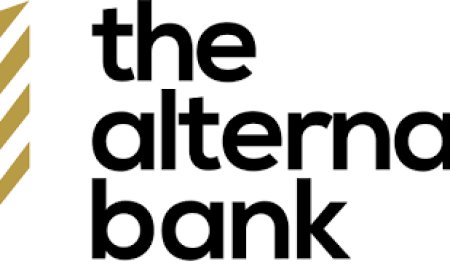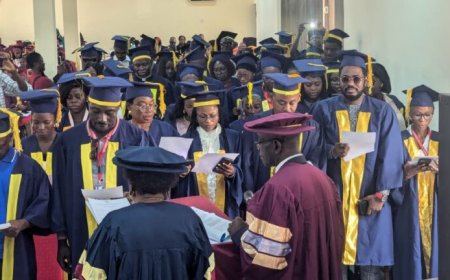ESUT’s Leap into the Future: How Professor Okolie is Redefining Education Through Innovation and ICT
In a world rapidly shaped by technology and innovation, institutions of higher learning are increasingly being challenged to produce graduates who are not only theoretically sound but also practically equipped to compete in a global digital economy.

By Ikechukwu Odu
In a world rapidly shaped by technology and innovation, institutions of higher learning are increasingly being challenged to produce graduates who are not only theoretically sound but also practically equipped to compete in a global digital economy. This challenge took a decisive turn at the Enugu State University of Science and Technology (ESUT) when the institution inaugurated a state-of-the-art ICT and Innovation Hub, a facility that promises to transform learning, research, and employment readiness across the institution and beyond.
For ESUT, this is not just a building. It is a statement, a declaration that the university is ready to reclaim its place as the technological heartbeat of the Southeast, bridging the gap between the ivory tower and the real world. The Hub represents a bold new vision under the leadership of the Vice Chancellor, Professor Aloysius-Michaels Okolie, whose academic reforms and commitment to practical learning are gradually reshaping the DNA of the institution.
A Hub for the Future
The ICT and Innovation Hub, situated within the ESUT campus, is designed to serve multiple purposes; a training ground for students, a capacity-building centre for staff, and an empowerment facility for members of the larger society. From coding and data analytics to entrepreneurship and digital marketing, the Hub is envisioned as a melting pot of creativity, where ideas are converted into solutions and learning is synonymous with doing.
Speaking during the commissioning ceremony, Professor Okolie, emphasized that the new centre was conceived as a response to the changing realities of the 21st-century job market.
“We want to merge the town and gown,” he declared, explaining that the Hub would serve as both a bridge and a catalyst, connecting academic knowledge with industrial practice.
According to him, the initiative is rooted in Governor Peter Mbah’s Smart School system and the broader agenda of experiential learning being pursued across Enugu State. “This Hub,” he noted, “will not only serve ESUT students and staff but will also be a training ground for government officials who are part of the state’s Smart School project. It will help actualize the governor’s vision of building a knowledge-driven economy.”
From Theory to Practice: ESUT’s Experiential Learning Revolution
For decades, Nigerian universities have been accused of producing graduates who are more equipped for examinations than for employment. The curriculum, often outdated and rigid, leaves little room for creativity, innovation, or hands-on training. But at ESUT, a quiet revolution is underway, one that seeks to rewrite that narrative.
Professor Okolie’s administration has introduced a new academic policy that requires all faculties and departments to ensure that students begin their final year projects right from their first year, starting with the 2025 intake. The goal, according to him, is to cultivate a culture of continuous research, innovation, and problem-solving from the onset.
“By assigning students into project groups from their first year,” he explained, “we want to build their confidence and creativity early. By the time they are in their final year, they should be able to produce solutions that can address real societal problems.”
In addition, the university has appointed a Director of Experiential Learning in every faculty to coordinate and monitor hands-on activities. The policy also enlists professionals from both academia and industry, “high-flying personages,” as the Vice Chancellor calls them, to teach pro bono across various departments. These include innovators, entrepreneurs, engineers, software developers, and other industry players who bring real-world experience into the classroom.
The Certification Model: Building Market-Ready Graduates
Perhaps the most ambitious part of the ESUT innovation drive is its market-ready certification programme. Under this model, every student will be required to complete three professional certifications before reaching their third year. These certifications, drawn from globally recognized platforms in information technology, entrepreneurship, and management, will serve as a practical counterpart to their academic degrees.
“We want to do things differently with our 100-level students,” Professor Okolie emphasized. “Before they get to 300 level, they must have been certified in three different areas to improve their skills and professional competence. We want industries to be struggling to hire our students even before they graduate.”
This statement echoes a larger vision, one where universities are no longer judged merely by their number of graduates, but by the employability and entrepreneurial capacity of those graduates. By integrating globally relevant certifications such as CompTIA, CISCO, AWS, or Microsoft courses, ESUT hopes to make its students not just job seekers but job creators.
Empowering Staff for a Changing World
The ICT and Innovation Hub is not exclusively for students. It is equally designed to empower academic and non-academic staff, ensuring that they remain relevant and financially stable even beyond retirement. Professor Okolie explained that part of the university’s mission is to help staff acquire secondary skills that could serve them both professionally and economically.
“This facility will help our staff increase their proficiency in ICT,” he said. “It will enable them to serve the university better while also becoming self-reliant after retirement. We want our lecturers and administrators to master digital tools, e-learning, data management, and other skills that are essential in today’s workplace.”
Beyond productivity, this policy reflects a humane and futuristic leadership philosophy , one that recognizes the changing nature of work and the need for continuous reskilling. In an era when artificial intelligence, robotics, and digital automation are redefining traditional jobs, ESUT’s initiative places its workforce ahead of the curve.
Bridging the Town and Gown: Building Synergy with Society
The term “town and gown” refers to the historical divide between universities and the communities around them. For years, Nigerian universities have been criticized for existing in isolation, disconnected from industries, entrepreneurs, and government development agenda. ESUT’s Innovation Hub seeks to close that gap.
As part of the programme, the university will partner with private firms, tech startups, government agencies, and NGOs to create a thriving ecosystem of innovation. Already, Crestage Ltd, a private technology solutions company, has partnered with ESUT to manage aspects of the Hub and coordinate certification programmes.
According to Elvis Obi-Nwankwo, a representative of Crestage Ltd, the initiative is more than an academic exercise, it is an economic necessity. “Nigeria currently faces a 40% unemployment rate,” he said. “By 2030, we are projected to have an 85 million-person ICT skills gap. What ESUT is doing today is not just timely, it is visionary. We are building a generation of digitally competent individuals who can compete globally.”
Another official of Crestage, Charles Emembolu, commended the Vice Chancellor’s foresight, urging other universities to emulate ESUT’s example. “This is what higher education should look like in the 21st century; innovative, practical, and responsive to market realities,” he said.
A Vision Anchored in Gov Mbah’s Experiential Learning Model
The ICT and Innovation Hub also aligns with Governor Peter Mbah’s experiential learning model , which emphasizes youth empowerment, digital transformation, and human capital development. By equipping young Nigerians with employable ICT skills, ESUT contributes directly to the national push for a technology-driven economy.
Governor Peter Mbah’s administration in Enugu State has also prioritized the digitization of education through the Smart School system. The ESUT Hub, according to the Vice Chancellor, will serve as a training base for state officials implementing the Smart School initiative, thereby creating a seamless link between basic education and tertiary learning.
This synergy between state policy and university innovation is a rare example of alignment between academia and government in Nigeria, a partnership that could set the pace for other states to follow.
Inside the Hub: A Peek into the Future
The ESUT Innovation Hub is a modern, technology-enabled facility equipped with computer laboratories, high-speed internet, programming workstations, seminar halls, and business incubation spaces. It is designed to host hackathons, workshops, start-up mentoring sessions, and virtual learning programmes.
Beyond ICT, the Hub will also support entrepreneurship development, offering courses on business strategy, startup management, and financial literacy. Students will be encouraged to form teams, pitch ideas, and receive mentorship from industry experts. The university plans to collaborate with international partners to expose students to global innovation ecosystems.
In addition, the Hub will host faculty-industry roundtables, where academic departments and corporate bodies will discuss curriculum reforms, internship opportunities, and research collaborations. The goal is to ensure that every academic programme in ESUT is informed by current industrial trends.
Tackling Unemployment Through Skill-Based Learning
Nigeria’s unemployment challenge remains one of the most pressing socio-economic issues of the decade. The National Bureau of Statistics (NBS) has repeatedly shown that a large proportion of unemployed Nigerians are university graduates, a clear indication that academic qualifications alone are no longer sufficient.
By focusing on skill-based learning and certification, ESUT’s Innovation Hub aims to address this challenge from the root. According to Crestage’s projections, students who pass through the Hub’s certification programmes will become competitive in global markets such as software development, cybersecurity, data analytics, cloud computing, and digital entrepreneurship.
This new direction, if sustained, could make ESUT one of the most employable universities in the country within the next decade. The university also plans to track graduates’ employment outcomes through an alumni innovation network, linking them with employers, investors, and mentors worldwide.
Reinventing ESUT’s Legacy
Founded in 1980 as the first state university of technology in Nigeria, ESUT was originally envisioned to be a centre of scientific and technological excellence. However, like many public universities, it has faced years of underfunding, infrastructural decay, and administrative instability.
But under Professor Okolie’s leadership, the narrative is changing. Since assuming office, he has pursued reforms in governance, research, and infrastructure development, anchored on transparency, innovation, and inclusiveness.
The ICT and Innovation Hub represents the crystallization of these efforts, a symbol of ESUT’s rebirth and commitment to its founding ideals. For many alumni, it rekindles hope that the university can once again be a model of technological advancement in Nigeria.
The Human Side of Innovation: Stories from Within
To understand the real impact of ESUT’s innovation drive, one only needs to listen to the students and staff who stand to benefit directly.
For Uchenna Ugwu, a senior administrative staff, the Hub represents a chance to future-proof his career. “Many of us in administration have not kept up with technology,” he admitted. “But with this new programme, I can learn data management and Excel analytics. It will help me both now and after retirement.”
Even the lecturers are not left out. Professor Okey Oji from the Faculty of Social Sciences and a member of ESUT Governing Council, described the Hub as “a bridge between academia and innovation.” He believes it will encourage research collaborations, digital teaching methods, and industry-linked projects.
Challenges Ahead
While the enthusiasm surrounding the Hub is palpable, sustaining such an ambitious project will require consistent funding, policy stability, and collaboration. ICT facilities demand regular upgrades, and without maintenance, they risk becoming obsolete within a few years.
Another challenge lies in integrating the new certification model into Nigeria’s rigid university curriculum, which is still largely regulated by the National Universities Commission (NUC). For ESUT to succeed, it must continuously negotiate academic flexibility within existing frameworks.
Moreover, the success of the Innovation Hub will depend on its ability to attract and retain competent trainers, maintain reliable internet access, and build lasting partnerships with industries.
Professor Okolie, however, remains optimistic. “Every innovation faces resistance at first,” he said. “But once people begin to see the results; graduates who are employable, staff who are skilled, and industries benefiting from our research, the system will fully embrace it.”
Repositioning ESUT in the Global Knowledge Economy
Education in the 21st century is no longer defined by the number of classrooms or lecture halls a university has, but by its capacity to generate knowledge that transforms society. Universities like MIT, Stanford, and the University of Cape Town have all leveraged innovation hubs and technology incubators to drive research and entrepreneurship.
With its new ICT and Innovation Hub, ESUT has joined that global movement. The university is positioning itself as a regional innovation centre for the Southeast , a place where ideas are tested, prototypes are developed, and startups are born.
Plans are already underway to establish partnerships with global organizations such as the United Nations Development Programme (UNDP), Google for Education, and Microsoft Africa, to support training, mentorship, and resource access for students.
Community Impact: Beyond the Campus Walls
The ripple effects of ESUT’s Innovation Hub are expected to extend beyond the university gates. Community youth groups, artisans, and small business owners in Enugu and neighbouring states will have access to ICT literacy training and entrepreneurship workshops organized through the Hub.
This aligns with ESUT’s broader mission of community service, one of the three pillars of higher education (alongside teaching and research). The university’s outreach programmes will help local entrepreneurs digitize their businesses, adopt e-commerce solutions, and access online markets.
A Model for Other Institutions
Education analysts have hailed the ESUT Innovation Hub as a potential model for other universities across Nigeria. According to Dr. Chioma Eze, an education policy researcher, “What ESUT is doing is exactly what Nigerian universities need , shifting from rote learning to competency-based education. If every university sets up an innovation hub linked to industry certification, we could cut graduate unemployment by half.”
Similarly, Mr. Charles Emembolu of Crestage Ltd believes the project will inspire a paradigm shift in higher education. “This is not just about technology,” he said. “It’s about changing mindsets. It’s about preparing young Nigerians to create value, not just to wait for white-collar jobs.”
Lighting the Path Forward
The commissioning of ESUT’s ICT and Innovation Hub marks a milestone, not only in the university’s history but also in the evolution of tertiary education in Nigeria. It symbolizes a break from the past and a leap into a future defined by innovation, collaboration, and digital competence.
As Professor Okolie and his team continue to push the boundaries of what is possible within a public university setting, one thing is clear: ESUT is no longer content with producing graduates who can only recite theories. It wants graduates who can build, create, innovate, and lead, graduates who can compete anywhere in the world.
In the coming years, as the Hub grows and the results begin to manifest in startups founded, technologies developed, and careers transformed, history may remember this moment as the day ESUT found its rhythm again. A rhythm powered by innovation, sustained
What's Your Reaction?

































































